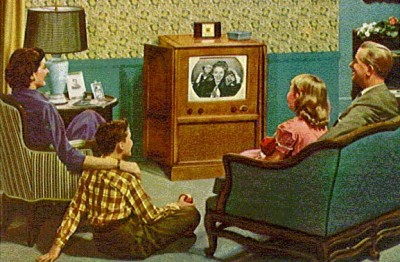Get a telly. Just get a telly.
There was a man I was talking to in the pub and he wound me up. It wound me up that he wound me up because he was a lovely guy. Stood his round, thoughtful, conscientious, witty. All you things you want from a friend of a friend in a pub. I had to rein myself in so I didn’t become the bad guy. The problem was that he was occupying a position which is guaranteed to have me gnashing the table.
When he found out I worked in telly, he mused on the fact that he didn’t own one. He had a baby, and wondered if he should expose his kid to TV. If he didn’t, would he be depriving them of something? He was genuinely interested to hear my point of view. Me, I love the telly, because at its best it’s an exciting, enthralling window on the world. But if you don’t see it that way, that’s your personal taste and I won’t argue with it.
Then I discovered: he makes documentaries. For television.
I will not stand for this. No no no. No. I’ve worked in television for 23 years now. Over those years I’ve been astounded by the number of people I’ve met who are established TV professionals, but who feel so little love for the art form that they won’t actually watch any of it. Sometimes they hold it in contempt. Mark Kermode is a film reviewer I always enjoyed. Then in 2007 he wrote this piece explaining how he was watching TV for the first time in years. He’d stopped watching on principle, believing it to be intrinsically inferior to cinema. That’s okay in itself; my problem is that in those years I’d watched him many times as a TV pundit. Television was beneath him, yet he clearly thought it was about the right level for me and millions of others. The Times once printed a spluttering letter I sent concerning one of their writers who celebrated her TV non-ownership – despite sometimes making BBC TV shows funded by licence payers. She’d been told The Office was good; she claimed she never needed to watch it, because she’d heard enough about it to know everything. TV by osmosis.
No, no, no, no no no. Again no. This sort of attitude pops up in the TV industry all too often, and television must not put up with it. If you’re a practitioner, you must be a viewer too. It’s compulsory. No argument.
I have a standard method of reasoning with the TV makers who watch no TV, and I deployed it in the pub. You take the other guy’s position regarding telly, transpose it to another art form, and invite their comment. It doesn’t much matter which art form. They won’t have a leg to stand on.
Say you work in theatre. Would you work with with a playwright who told you he didn’t like plays and never watched them? No.
Would you watch a film by a director who told you she didn’t like movies? No. I bet Mark Kermode wouldn’t either.
You never find musicians who don’t like music, dancers who don’t watch dance, football managers who never see football, painters who never look at paintings. If I was hiring an architect, I wouldn’t pick the one who said “oh, I never look at buildings. I don’t really like them. And I’m not sure I should ever show my child a building in case it corrupts them.”
You don’t hear of people like that because they’d be run out of town. The one art form where they exist is TV. A minority, but there they are, and telly tolerates them. It shouldn’t. Not ever.
Give me telly by people who love it. They make the best stuff. Any interview with Richard Osman will show you his deep fascination with game and quiz shows. That’s why it’s him who brought us the sublime Pointless. When asked what the T stood for, Russell T Davies said the T is for Television. That’s the stuff!
The dedicated non-tv-watchers are compromised now, in a way they weren’t just a few years back. The man in the pub had Netflix, and loved one particular comedy show on it as much as I do. I pointed out that he effectively WAS watching telly, even if he didn’t count it as that. Yet he drew a distinction. That was a show he really wanted to watch, and had sought out. The idea of coming home, turning on the telly, and seeing what was on was utterly alien to him. I asked him what he’d think of an author who simply couldn’t understand the urge to wander into a bookshop and browse the shelves. To his credit, he took the point. He was a good guy. Just holding a ridiculous position. He promised to get a TV.
TV makers mustn’t be meek about this. Don’t let it slide. Have some pride in the art. If people we work with say they don’t watch telly, challenge them. Hold their feet to the flames. Let’s give them one week to start watching. And if they can’t manage that, they should get out of the way and leave it to those of us who do.

